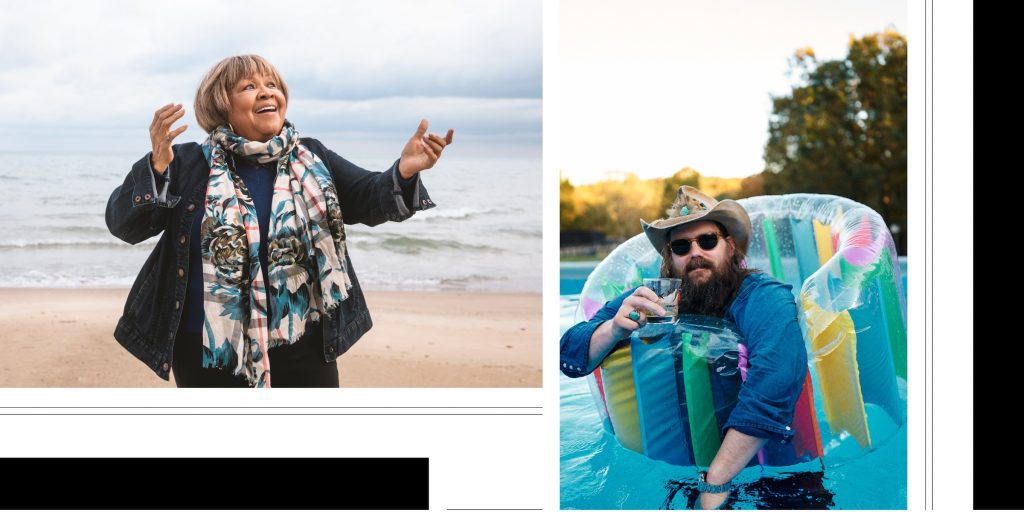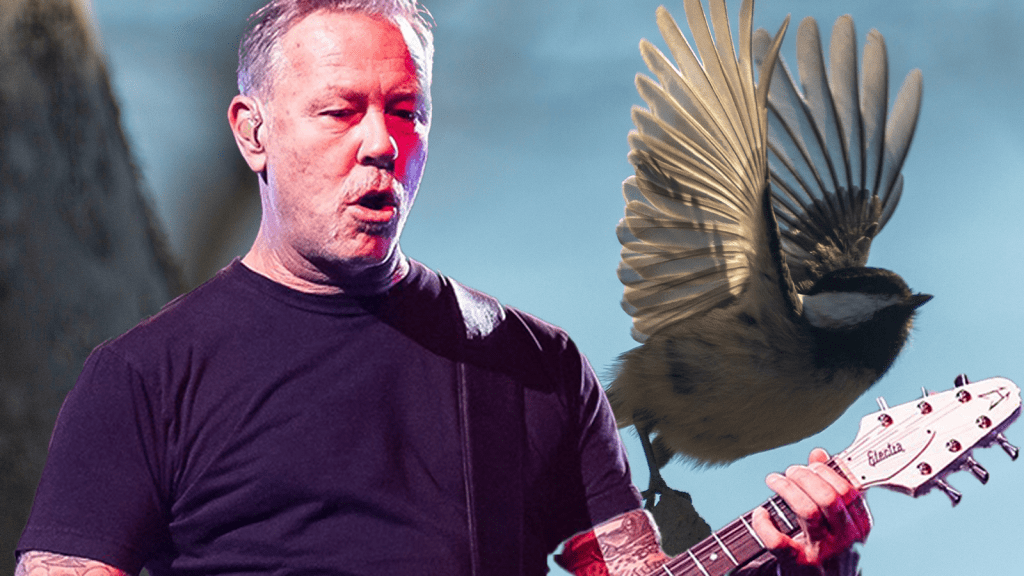
MUSICIANS ON MUSICIANS Mavis Staples & Chris Stapleton
MUSICIANS ON MUSICIANS
Mavis Staples & Chris Stapleton
The soul legend and the country star have formed a deep bond, especially during the pandemic. ‘We gotta be related,’ she says
“How you been, Mavis?” Chris Stapleton asks from Tennessee, where he lives. “I’ve been OK,” says Mavis Staples, who’s in Chicago. “My bass player sent me a puzzle of the whole band onstage. 500 pieces!” Staples, 81, is contending with her longest break since she started singing with the Staple Singers — her father, Pops, her sisters Cleotha and Yvonne, and brother Pervis — in the 1950s. “I like being in the house, but not this long.” It’s not unusual for Stapleton to call her up; they met after he recorded her late father’s ballad “Friendship” for his 2017 platinum-selling album, From A Room: Volume Two. “It blew my mind,” says Staples of the recording. “I had been keeping up with Chris, because of his name. I said, ‘Stapleton, Stapleton.’ I told him, ‘We gotta be related.’”
Stapleton’s producer, Dave Cobb, played him “Friendship,” which Pops recorded in 1999, a year before his death. It led Stapleton to the Staple Singers’ early-Seventies Stax era, when the family released empowering gospel-soul classics like “Respect Yourself” and “I’ll Take You There.” “There’s a realness when they sing that’s not something you can practice,” he says. “It comes from somewhere else.”
blogherads.adq.push(function () {
blogherads
.defineSlot( ‘medrec’, ‘gpt-dsk-tab-article-inbody1-uid0’ )
.setTargeting( ‘pos’, [“mid-article”,”mid”,”in-article1″,”mid-article1″] )
.setSubAdUnitPath(“music//article//inbody1”)
.addSize([[300,250],[620,350],[2,2],[3,3],[2,4],[4,2]])
;
});
“If I got sick, Chris would come and help me out,” says Staples, who released her latest album, We Get By, last year. (Stapleton also just released an LP, Starting Over.) Describing their relationship, she starts singing “Friendship”: “We got friendship, the kind that lasts a lifetime.” Says Stapleton, “You’re making me tear up right now.”
Stapleton: What’s your earliest memory of singing in public?
Staples: We were at my Aunt Katie’s church. We sang the first song Pops taught us, “Will the Circle Be Unbroken.” The people kept clapping us back, but we didn’t know what an encore meant, so we went to sit down. Someone came over and told us, “They want to hear you again. You’ve got to sing another song.” Well, we ended up singing “Will the Circle Be Unbroken” three times, because it was the only song Pops had taught us all the way through. After that, Pops said, “Shucks, these people like us. We’re going home and we’re going to make some more songs.” That’s how it started.
Stapleton: When me and Dave Cobb decided to play “Friendship,” the song you and Pops had recorded, we got off on a guitar-nerd session. We tried to figure out what tremolo pedal your dad used. We landed on a mechanical tremolo, one of the first pedals ever made. We found a couple that were not working and we spent way too much money trying to have them repaired. And then we plugged them in and we immediately realized that we weren’t Pops Staples, because no matter what pedal we had, or what amp we had, or what guitar, we still didn’t sound like your dad.
Staples: Elvis Presley told me one time — him and his boys were watching one of our shows in Memphis — “I like the way your father played that guitar. He plays a nervous guitar.”
Stapleton: I didn’t realize that you did a bunch of things with [guitarist-producer] Steve Cropper, and I didn’t draw this parallel until I was reading about it. I hear a lot of your daddy’s influence on Cropper’s guitar playing. What are some of your memories of working in that era — the Stax era?
Staples: Steve produced our very first record on Stax. Steve and Pops, they’d be in the studio playing their guitars with Booker T. and Donald Dunn. That shocked us, to get to Stax and to see two white boys and two black boys playing together. You weren’t supposed to [see that].
I don’t know if Pops even knew that he influenced a lot of guitar players. Pops learned how to play guitar at Dockery Farms [in Dockery, Mississippi] from Charlie Patton. We didn’t know that for years we were singing gospel but Pops was playing blues on his guitar. We always thought the blues was something we shouldn’t listen to. Muddy Waters and B.B. King, all them, were friends with him. [But] he’d say, “No, the blues and the gospel, they first cousins, Mavis. You got to get your history together.” I didn’t know blues and gospel were first cousins. And country is, too.
blogherads.adq.push(function () {
blogherads
.defineSlot( ‘medrec’, ‘gpt-dsk-tab-article-inbody2-uid1’ )
.setTargeting( ‘pos’, [“mid-article2″,”mid”,”in-article2″,”mid-article”] )
.setSubAdUnitPath(“music//article//inbody2”)
.addSize([[300,250],[300,251],[620,350],[2,4],[4,2],[3,3]])
;
});
“We tried to figure out what tremolo pedal your dad used. We found a couple and spent way too much money repairing them. We plugged them in and realized no matter what pedal we had, we weren’t Pops Staples,” says Stapleton
Stapleton: Did you ever work with B.B. King, Muddy Waters, or some of those guys you mentioned?
Staples: Howlin’ Wolf lived not just a few doors down the street from us [in Chicago]. He was so tall, Pops’ forehead would be at Howlin’ Wolf’s belt. You’re making me remember a lot of stuff. Pops sang at Muddy Waters’ funeral. And B.B. King, he’d say to Pops, “You can sing and play at the same time. I can’t do that.” B.B. King would go to Japan and would send Pops souvenirs — cameras and stuff. I said, “He really likes you!”
Stapleton: What was it like touring back in the day? You hear the bluegrass guys talk about strapping a bass on top of their station wagon, things like that. How did you travel?
Staples: When we first started traveling, Pops had a turquoise Bel Air. That was in the Fifties. Then, when we started making some money, we would travel in this Cadillac. I was the night driver. One time I pulled into the service station, Chris. OK, this is a long story I’m not going to tell, but we went to jail that night.
Stapleton: You can’t tell us that you went to jail and not tell the whole story.
Staples: What happened was, I had driven from Jackson [Mississippi] to Memphis, and I pulled into a service station at Third and Union. This long, tall white guy came out, and he filled up the car, and then he wanted his money. There were a lot of bugs on the windshield, so I said, “Will you clean the windshield?” He looked at me a long time, and I could tell he was mad. I asked him for a receipt. He looked at me and said, “If you want a receipt, n-word, you can come over to the office.” Pops went into the office, and [the man] shook his finger in Daddy’s face. When he did that, Pops clocked him, and they fought. Pervis got out of that car like Superman and came down on this guy. The guy started running away. Then Pops said, “Mavis, drive.” So I started driving.
I got across the bridge. Three police cars — they had shotguns on us, they had the dogs barking. I’ve never been so scared in my life. They started searching our car. When they went in the trunk, our money from the gig was in a cigar box. The officer said, “Where’d you get this kind of money, boy?” Pops said, “We sang for that money tonight.” After a while, they put us in handcuffs. I thought they were taking us to the woods to lynch us. I had never been so glad to see a police station in my life. When Daddy walked in, there was a black man mopping the floor. He looked up and said, “Poppa Staples, what you doing here?” Pops kept walking. We laughed about that way later.
Stapleton: It wasn’t funny at the time, I would imagine.
blogherads.adq.push(function () {
blogherads
.defineSlot( ‘medrec’, ‘gpt-dsk-tab-inbodyX-uid2’ )
.setTargeting( ‘pos’, [“mid”,”mid-articleX”,”in-articleX”,”mid-article”] )
.setSubAdUnitPath(“music//article//inbodyX”)
.addSize([[300,250],[300,251],[3,3],[620,350]])
.setLazyLoadMultiplier(2)
;
});
Staples: It wasn’t. The receipt is what saved us. The man had told the police we robbed them and beat him up and we didn’t pay for our gas. When the chief saw the receipt, he said, “Get those handcuffs off those people. Let them go home.” We had some times in the South, Chris.
Stapleton: It’s important for me to hear stories like these just so I know what’s up. My experiences are vastly different. I don’t have any concept, really, of that. I want to hear those stories. I want to know what had to take place. That’s wild to me, to hear that. And unthinkable to live.
Staples: I need to say this. When [George] Floyd was under that man’s knee, [you] called me and said, “Mavis, I just want to know how you’re doing.” And [you] said something to me that really got me, [you] said, “Mavis, I just didn’t know. I must have had blinders on.” I said, “Chris, you didn’t have no blinders on, there was no way for you to know what black people have been going through.” But that made me feel so good, that [you] were thinking about me. That’s a true friend. I got off that phone and tears just wouldn’t stop flowing. I was just so grateful for that.
Stapleton: How did your dad’s last record [2015’s posthumous Don’t Lose This, produced by Staples and Jeff Tweedy] come about?
Staples: Pops was sick, and he called me and said, “Mavis, bring me the music to my room, I wanna hear it.” After he heard it, he said, “Mavis, don’t lose this.” And that was why I named the LP Don’t Lose This.
Stapleton: I love hearing these things, all these stories.
Staples: That’s all I got, is a bunch of stories now, Chris.
blogherads.adq.push(function () {
blogherads
.defineSlot( ‘medrec’, ‘gpt-dsk-tab-inbodyX-uid3’ )
.setTargeting( ‘pos’, [“mid”,”mid-articleX”,”in-articleX”,”mid-article”] )
.setSubAdUnitPath(“music//article//inbodyX”)
.addSize([[300,250],[300,251],[3,3],[620,350]])
.setLazyLoadMultiplier(2)
;
});




